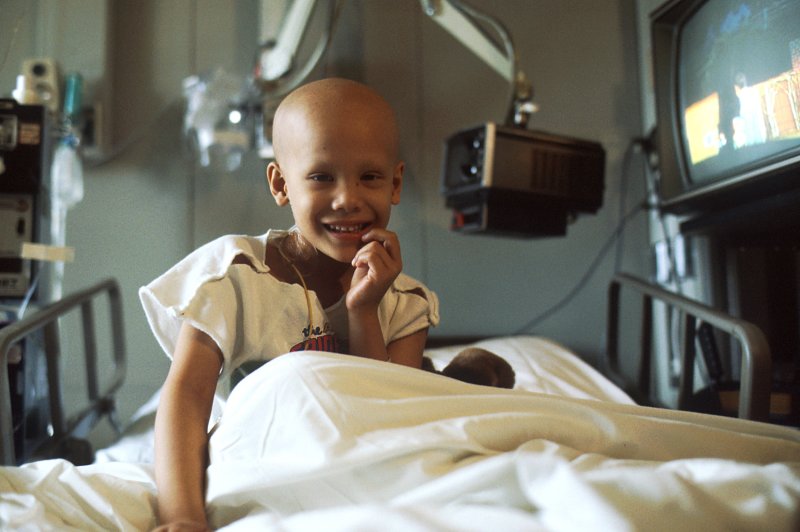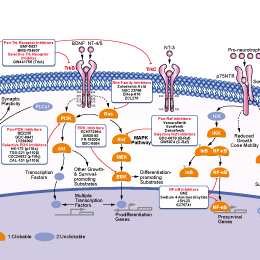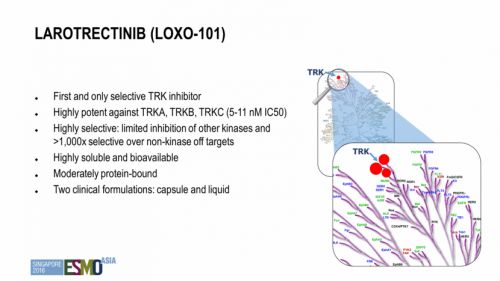Helpt u ons aan 500 donateurs?
26 november 2018: Lees ook dit artikel:
3 april 2018: met dank aan Arthur die me op deze studie wees.
De studieresultaten met Larotrectinib (LOXO-101) bij solide tumoren met een specifieke TRK mutatie (zie ook verderop in dit artikel) zijn onvoorstelbaar goed. In de laatste studiepublicatie reageerde 75 procent van de volwassenen met minimaal een PR = gedeeltelijke respons van 50 procent tumorvermindering, maar ook met enkele CR = complete remissies. (zie ook verderop in dit artikel meer informatie over de volwassenenstudie met solide tumoren)
Bij kinderen blijken de resultaten nog indrukwekkender. 93 procent reageerde met minimaal 50 procent tumorvermindering. Van de 24 kinderen (gemiddelde leeftijd was 4,5 jaar in een schaal van 1 maand tot 21 jaar) die werden aangemeld voor de studie hadden er 17 een juiste TRK mutatie. 2 kinderen vielen af voor de studie maar van nagenoeg alle kinderen die meededen aan de studie 14 van de 15 kinderen (93 procent) met een juiste TRK mutatie reageerden positief op larotrectinib met minimaal 50 procent vermindering van tumor omvang en tumor aantal inclusief een aantal totale remissies. En de bijwerkingen waren te overzien en goed behandelbaar. Een mooi voorbeeld van zo'n succesverhaal is dat van een 13 jarig kind met recidief van kanker rondom haar aorta die heel goed reageerde op larotrectinib terwijl ze terminaal ziek was:

Source: UPI, The drug larotrectinib was effective in 93 percent of pediatric patients tested in a Phase 1 clincial trial, according to researchers at the University of Texas Southwestern. Photo by Bill Branson/National Cancer Institute
De resultaten van de studie met de kinderen zijn deze week gepubliceerd in The Lancet. Abstract staat ondraan dit artikel
23 juni 2017: bron: ASCO 2017 en Cancer Discovery
"De totale respons was 76%, wat vrij ongebruikelijk is voor een gerichte therapie en complete remissies werden gezien bij 12% van de patiënten, die allemaal vergevorderde kanker hadden. Dit is echt ongekend,"aldus Trever Bivona, MD, PhD, van de Universiteit van Californië, San Francisco.
"Deze gegevens over larotrectinib zijn de droom van elke onderzoeker," zegt Patricia LoRusso, DO, associate director of innovative medicine en professor of medicine aan het Yale Cancer Center, New Haven, Connecticut
"TRK-fusies zijn zeldzaam maar komen voor bij veel verschillende soorten kanker. Wij vermoeden dat bij ongeveer 5% van alle kankerpatienten met solide tumoren deze mutatie voorkomt van patienten met gevorderde kanker. In feite is het op dit moment moeilijk om een kankertype te vinden waar TRK-fusies niet bij voorkomen," zegt onderzoeksleider David Hyman, MD, chief of early drug development at Memorial Sloan Kettering Cancer Center in New York City.

Dr David Hyman
"Wij zijn ervan overtuigd dat de dramatisch goede reacties van larotrectonib bij tumoren met TRK-mutaties verder wijdverspreid genetisch onderzoek gaat ondersteunen bij patiënten met gevorderde kanker om te zien of deze een bepaalde mutatie heeft," aldus dr. Hyman
"Het nieuwe geneesmiddel brengt ons in een nieuw tijdperk, waar de behandeling echt gebaseerd zal zijn op mutatie, niet op locatie / orgaan," aldus ASCO expert Sumanta Kumar Pal, MD, van het City of Hope's comprehensive cancer center near Los Angeles, California.
"Toen ik nog in opleiding was, nog niet zo lang geleden, zou het een droom zijn geweest om te denken dat we kanker onafhankelijk van hun primiare vorm / orgaan zouden behandelen," zei Dr Pal.
"Borstkanker werd behandeld met borstkanker medicijnen, enz. Maar met deze nieuwe gegevens lijken veel kankervormen nu te behandelen op een manier die onafhankelijk is van hun primaire orgaan en het lijkt beter een behandeling te baseren op moleculaire criteria."
Dit is de droom van personalised medicine, maar tot nu toe zijn er toch ook wel twijfels, omdat sommige mutaties activiteit tonen in bepaalde kankersoorten maar niet bij andere vormen. Een voorbeeld daarvan zijn BRAF-remmers, die wel werken in BRAF-gemuteerde melanoom en schildklierkanker bv, maar niet bij BRAF-gemuteerde vormen van darmkanker."
De recente resultaten en goedkeuring voor pembrolizumab (Keytruda, Merck) voor tumoren met zogeheten microsatellite instabiliteit,is de eerste FDA goedkeuring voor een genetische mutatie i.p.v. op basis van primaire tumor. Maar pembrolizumab is een vorm van immuuntherapie en wordt per infuus gegeven, terwijl larotrectonib een gericht medicijn is en oraal wordt gegeven. Aldus dr. Hyman
 Werkingsmechanisme van larotrectonib
Werkingsmechanisme van larotrectonib
Bijwerkingenprofiel:
Ook de bijwerkingen van larotrectonib zijn te overzien: Geen van de patiënten moest de behandeling stoppen vanwege de bijwerkingen en slechts 5 patiënten (11%) hadden dosisverlagingen nodig. De meest voorkomende bijwerkingen die bij de nieuwe medicijnen werden gezien, waren vermoeidheid (bij 30% van de patiënten), misselijkheid (28%) en duizeligheid (28%); Duizeligheid was verwacht omdat het normale TRK-eiwit een rol speelt bij het beheersen van evenwicht, aldus Dr Hyman. "Omdat larotrectinib alleen gericht is op de TRK muitatie, is het zeer goed te verdragen en veroorzaakt het niet veel van de bijwerkingen die meestal optreden bij chemotherapie en multigerichtte therapie," aldus dr. Hyman.
Larotrectinib has demonstrated consistent and durable antitumor activity in TRK fusion cancers, across a wide range of ages and tumor types, and was well-tolerated. Larotrectinib could be the first targeted therapy developed in a tissue type-agnostic manner, and the first developed simultaneously in adults and pediatrics.
The efficacy of larotrectinib (LOXO-101), a selective tropomyosin receptor kinase (TRK) inhibitor, in adult and pediatric TRK fusion cancers.
Sub-category:
Small Molecules
Category:
Developmental Therapeutics—Clinical Pharmacology and Experimental Therapeutics
Meeting:
2017 ASCO Annual Meeting
Abstract No:
LBA2501
Citation:
J Clin Oncol 35, 2017 (suppl; abstr LBA2501)
Author(s): David Michael Hyman, Theodore Willis Laetsch, Shivaani Kummar, Steven G. DuBois, Anna F. Farago, Alberto S. Pappo, George D. Demetri, Wafik S. El-Deiry, Ulrik Niels Lassen, Afshin Dowlati, Marcia S. Brose, Valentina Boni, Brian Turpin, Ramamoorthy Nagasubramanian, Scott Cruickshank, Michael Craig Cox, Nora C. Ku, Douglas S. Hawkins, David S. Hong, Alexander E. Drilon; Memorial Sloan Kettering Cancer Center, New York, NY; University of Texas Southwestern, Dallas, TX; Department of Medicine–Oncology, Palo Alto, CA; Dana-Farber Cancer Institute/Boston Children's Cancer and Blood Disorders Center, Boston, MA; Massachusetts General Hospital, Boston, MA; St. Jude Children's Research Hospital, Memphis, TN; Dana-Farber Cancer Institute/Harvard Medical School, Boston, MA; Fox Chase Cancer Center, Philadelphia, PA; Rigshospitalet, Copenhagen, Denmark; UH Cleveland Medical Center, Cleveland, OH; Department of Otorhinolaryngology: Head and Neck Surgery, Abramson Cancer Center of the University of Pennsylvania, Philadelphia, PA; START Madrid CIOCC, Hospital HM Universitario Sanchinarro, Madrid, Spain; Cincinnati Children's Hospital Medical Center, Cincinnati, OH; Nemour's Children's Hospital, Orlando, FL; Scott Cruickshank and Associates, Santa Barbara, CA; Loxo Oncology, Inc., San Francisco, CA; Seattle Children’s Hospital, University of Washington, Fred Hutchinson Cancer Research Center, Seattle, WA; The University of Texas MD Anderson Cancer Center, Houston, TX
Background: Larotrectinib is the first selective small-molecule pan-TRK inhibitor. TRK fusions appear oncogenic independent of tumor lineage, are widely distributed across cancers, and affect all ages. We present an integrated dataset from 3 studies intended to support regulatory approval.
Methods: All NTRK fusion pts with RECIST measurable disease enrolled to the adult (NCT02122913, n=8) and pediatric (NCT02637687, n=12) phase I trials and adult/adolescent phase 2 trial (NCT02576431, n=35) were analyzed. TRK fusion status was determined by local testing prior to enrollment. Pts were dosed predominantly at 100mg BID on a continuous 28-day schedule. Primary objective was investigator-assessed overall response rate (ORR) per RECIST v1.1. Secondary endpoints included duration of response (DOR) and safety. Data were cut on 31-JAN-2017.
Results: 55 TRK fusion pts (12 peds, 43 adult, range: 4 mo.-76 yrs) were enrolled (median priors=2). Fusions involved NTRK1 (n=25), NTRK2 (n=1), and NTRK3 (n=29), and 14 unique partners. 13 discrete tumor types were treated: salivary (12), sarcoma (10), infantile fibrosarcoma (7), lung (5), thyroid (5), colon (4), melanoma (4), cholangio (2), GIST (2), and other (4). For the 46 pts evaluated to date, the ORR was 78% (95% CI: 64%–89%) with responses in 12 unique tumor types. Responses are ongoing in 29/33 (88%) pts, excluding 3 peds pts whose DOR was censored at attempted curative resection. A median DOR has not been reached as the majority of responders remain on treatment without progression. The longest responder remains on treatment at 23 mos., 8 pts remain in response at >12 mos., and 16 pts at >6 mos. NTRK solvent front mutations were detected in all 4 pts to develop acquired resistance. The most common TEAEs were fatigue (30%), dizziness (28%), and nausea (28%). 5 (11%) pts required dose reductions.
Conclusions: Larotrectinib has demonstrated consistent and durable antitumor activity in TRK fusion cancers, across a wide range of ages and tumor types, and was well-tolerated. Larotrectinib could be the first targeted therapy developed in a tissue type-agnostic manner, and the first developed simultaneously in adults and pediatrics. Clinical trial information: NCT02576431, NCT02122913, NCT02637687
The TRK inhibitor larotrectinib was well tolerated in paediatric patients and showed encouraging antitumour activity in all patients with TRK fusion-positive tumours. The recommended phase 2 dose was defined as 100mg/m2 (maximum 100 mg per dose) for infants, children, and adolescents, regardless of age.
Larotrectinib for paediatric solid tumours harbouring NTRK gene fusions: phase 1 results from a multicentre, open-label, phase 1/2 study
Summary
Background
Gene fusions involving NTRK1, NTRK2, or NTRK3 (TRK fusions) are found in a broad range of paediatric and adult malignancies. Larotrectinib, a highly selective small-molecule inhibitor of the TRK kinases, had shown activity in preclinical models and in adults with tumours harbouring TRK fusions. This study aimed to assess the safety of larotrectinib in paediatric patients.
Methods
This multicentre, open-label, phase 1/2 study was done at eight sites in the USA and enrolled infants, children, and adolescents aged 1 month to 21 years with locally advanced or metastatic solid tumours or CNS tumours that had relapsed, progressed, or were non-responsive to available therapies regardless of TRK fusion status; had a Karnofsky (≥16 years of age) or Lansky (<16 years of age) performance status score of 50 or more, adequate organ function, and full recovery from the acute toxic effects of all previous anticancer therapy. Following a protocol amendment on Sept 12, 2016, patients with locally advanced infantile fibrosarcoma who would require disfiguring surgery to achieve a complete surgical resection were also eligible. Patients were enrolled to three dose cohorts according to a rolling six design. Larotrectinib was administered orally (capsule or liquid formulation), twice daily, on a continuous 28-day schedule, in increasing doses adjusted for age and bodyweight. The primary endpoint of the phase 1 dose escalation component was the safety of larotrectinib, including dose-limiting toxicity. All patients who received at least one dose of larotrectinib were included in the safety analyses. Reported here are results of the phase 1 dose escalation cohort. Phase 1 follow-up and phase 2 are ongoing. This trial is registered with ClinicalTrials.gov, number NCT02637687.
Results
Between Dec 21, 2015, and April 13, 2017, 24 patients (n=17 with tumours harbouring TRK fusions, n=7 without a documented TRK fusion) with a median age of 4·5 years (IQR 1·3–13·3) were enrolled to three dose cohorts: cohorts 1 and 2 were assigned doses on the basis of both age and bodyweight predicted by use of SimCyp modelling to achieve an area under the curve equivalent to the adult doses of 100 mg twice daily (cohort 1) and 150 mg twice daily (cohort 2); and cohort 3 was assigned to receive a dose of 100 mg/m2 twice daily (maximum 100 g per dose), regardless of age, equating to a maximum of 173% of the recommended adult phase 2 dose. Among enrolled patients harbouring TRK fusion-positive cancers, eight (47%) had infantile fibrosarcoma, seven (41%) had other soft tissue sarcomas, and two (12%) had papillary thyroid cancer. Adverse events were predominantly grade 1 or 2 (occurring in 21 [88%] of 24 patients); the most common larotrectinib-related adverse events of all grades were increased alanine and aspartate aminotransferase (ten [42%] of 24 each), leucopenia (five [21%] of 24), decreased neutrophil count (five [21%] of 24), and vomiting (five [21%] of 24). Grade 3 alanine aminotransferase elevation was the only dose-limiting toxicity and occurred in one patient without a TRK fusion and with progressive disease. No grade 4 or 5 treatment-related adverse events were observed. Two larotrectinib-related serious adverse events were observed: grade 3 nausea and grade 3 ejection fraction decrease during the 28-day follow-up after discontinuing larotrectinib and while on anthracyclines. The maximum tolerated dose was not reached, and 100 mg/m2 (maximum of 100 mg per dose) was established as the recommended phase 2 dose. 14 (93%) of 15 patients with TRK fusion-positive cancers achieved an objective response as per Response Evaluation Criteria In Solid Tumors version 1.1; the remaining patient had tumour regression that did not meet the criteria for objective response. None of the seven patients with TRK fusion-negative cancers had an objective response.
Interpretation
The TRK inhibitor larotrectinib was well tolerated in paediatric patients and showed encouraging antitumour activity in all patients with TRK fusion-positive tumours. The recommended phase 2 dose was defined as 100mg/m2 (maximum 100 mg per dose) for infants, children, and adolescents, regardless of age.
Funding
Loxo Oncology Inc.
Gerelateerde artikelen
- 6 nieuwe doorbraken in de strijd tegen kanker worden gepresenteerd door het World Economic Forum met bijbehorende video
- 90 procent van mensen met uitgezaaide kanker heeft meerdere DNA afwijkingen. Slechts 5 procent kreeg ook optimale behandeling daarvoor.
- Antibiotica binnen een maand vooraf aan immuuntherapie met anti-PD medicijnen geeft veel slechtere resultaten op overall overleving dan zonder antibiotica bij verschillende vormen van primaire kanker.
- Anti-PD medicijnen zoals nivolumab, Pembrolizumab en atezolizumab gegeven als immuuntherapie geven zeer goede resultaten bij verschillende vormen van kanker met solide tumoren, zelfs zonder Ligand-1 receptorstatus copy 1
- Bacterien in uitzaaiingen van kankerpatienten zijn door Nederlandse onderzoekers in beeld gebracht en in een gedetailleerde catalogus opgeslagen
- Behandelen van kanker verschuift steeds meer van chemotherapie naar biologische behandelingen, gerichte therapie waaronder immuuntherapie met gemoduleerde virussen die de minste bijwerkingen geven
- Biomarkers zoals PD-L1, CD163+ en NRAS mutaties en gegevens zoals uitzaaiingen later ontstaan bepalen kans van effectiviteit van immuuntherapie met anti PD medicijnen bij melanomen
- Bloedtesten, een overzicht van recent gepubliceerde resultaten van verschillende bloedtesten
- CHRISPR-CAS9 infuus blijkt genezende behandeling voor erfelijke aandoening angio-oedeem, aldus tussenresultaten van internationale studie met Nederlandse deelname.
- CLEVER studie: Waarom kanker jaren later kan terugkeren - en hoe dit te voorkomen. CLEVER studie bij borstkankerpatienten bewijst dat een recidief is te voorkomen door tumorcellen in beenmerg te behandelen.
- De biologische processen waarom en hoe kankercellen uitzaaien wordt beter begrepen, tumorcellen vroeger ontdekt en lijkt ook steeds beter te behandelen
- De huidige staat van moleculair testen in het behandelen van kankerpatienten met solide tumoren. Een uitstekend overzichtsartikel met de nieuwste ontwikkelingen over RNA, DNA en eiwitten anno 2019
- Diagnosetest PERCEPTION via AI - Kunstmatige Intelligentie ontwikkeld en met hulp van single-cell RNA-sequencing voorspelt nauwkeurig of een specifiek medicijn van de kankerpatient zal aanslaan of resistent zal zijn.
- DRUP studie geeft bij 37 procent van de patienten alsnog een therapeutisch effect met 6 procent CR en 14 procent PR en 17 procent stabiele ziekte
- EMA: Veel nieuwe kankermedicijnen in de EU hebben geen bewezen toegevoegde waarde blijkt uit Nederlandse studie naar goedgekeurde kankermedicijnen door het Europees Geneesmiddelenbureau (EMA).
- Erfelijkheid van kanker hangt vaak af van specifieke afwijkende genencombinaties in DNA onderzoek en eiwitexpressie blijkt uit groot Whole Exome Sequencing onderzoek via de Biobank van de UK.
- ESMO - European Society for Medical Oncology heeft een gids uitgegeven voor patienten over hoe personalised medicine werkt en stand van zaken
- FDA ondersteunt onderzoek naar personalised medicine op basis van mutaties ongeacht in welk lichaamsdeel de kanker zich het eerst openbaart.
- Genetisch onderzoek via Germline testen (kiembaan testen) werd in periode 2013 tot 2019 in Georgie en Californie bij slechts 7 procent gedaan onder 1 369 602 patienten met twee jaar kanker.
- Genetische mutatie ontdekt die kans van slagen van immuuntherapie bij alle vormen van kanker naar 100 procent zou kunnen brengen
- Geneesmiddel (ARS1620) verandert kankergen (KRAS mutatie) dat kwaadaardige tumoren beschermt tegen immuunsysteem in een doelwit voor immuunsysteem en helpt immuuntherapie kankercellen te elimineren
- Gentherapie zoals Chrispr-cas en base-editors zijn zeer succesvol bij erfelijke ziekten waaronder ook vormen van kanker zoals sikkelcelziekte
- Gerichte behandelingen met Aurora kinaseremmers geven soms uitstekende resultaten bij veel vormen van kanker. Een reviewstudie
- Immuunafwijkingen bij kankerpatienten gerelateerd aan infecties voortijdig ontdekken zouden in behandelingen van kanker sterven aan kanker met 25 procent of meer kunnen voorkomen
- Immuuntherapie met HER2-gerichte CT-0508 (CAR-Macrofaag therapie) geeft bij solide tumoren van verschillende vormen van kanker met HER2 positieve expressie hoopvolle resultaten
- Immuuntherapie met pembrolizumab bij patiënten met verschillende vormen van uitgezaaide kanker met hoge microsatellietinstabiliteit (MSI-H) en DNA-mismatch-reparatie-deficiënte (dMMR) geeft uitstekende en duurzame resultaten op overall overleving
- Immuuntherapie met nivolumab zorgt voor duurzame en sterk verbeterde overall overleving bij verschillende vormen van kanker, melanomen, longkanker en nierkanker copy 1
- Interleukin-15 speelt een cruciale rol wanneer gegeven samen met immuuntherapie voor verschillende vormen van kanker met solide tumoren en biedt veelbelovende mogelijkheden voor verbeterde behandelingen
- Internationale groep van 180 wetenschappers stelt rapport op hoe en met welke niet-toxische middelen - voedingsstoffen de effectiviteit te verbeteren, recidieven te voorkomen en de bijwerkingen te verminderen van personalised medicine
- Irina Kareva gebruikt wiskundige modellen die de dynamiek van kanker beschrijven, met het doel nieuwe geneesmiddelen te ontwikkelen die gericht zijn op tumoren.
- Kanker-actueel kan en wil helpen - begeleiden bij aanvragen van een volledig biomoleculair receptorenonderzoek en genenonderzoek
- Erfelijkheid: Kanker is vaak domme pech stelt prof. dr. Nicoline Hoogerbrugge van het Radboudumc en de Radboud Universiteit in een interview in de Stentor en Algemeen Dagblad
- Kankermedicijnen geven in de klinische praktijk veel minder effect dan uit de studies van farmaceutische bedrijven is aangetoond. Maar zijn wel ontzettend duur.
- Kankerremmende eiwitten kunnen bij mutatie die gen uitschakelt veranderen van kankerremmend in stimulerend, ontdekten Nederlandse onderzoekers
- Larotrectinib geeft bijzonder goede resultaten (76 procent respons met 12 procent complete remissies) bij alle vormen van solide tumoren met een positieve TRK Fusion mutatie
- Larotrectinib: Met de goedkeuring van Larotrectinib op basis van 1 specifieke afwijking en niet op basis van primaire tumor zorgt de FDA voor een doorbraak in het behandelen van kanker
- Lenvatinib Plus Pembrolizumab bij patiënten met inoperabele gevorderde nierkanker, buikvlieskanker, melanomen en andere gevorderde kanker met solide tumoren geeft uitstekende resultaten met meer dan de helft remissies van 50 procent of meer copy 1
- Medicijnen voorschrijven op basis van DNA profiel van de patient voorkomt 30 procent minder bijwerkingen blijkt uit internationale studie onder leiding van LUMC Leiden
- Moleculaire schakelaar verandert kankercellen in weer normale cellen en zou genezende aanpak van kanker kunnen betekenen
- MSC-1 een medicijn dat de groei van de kankerstamcellen afremt door LIF blokkade en immuunsysteem activeert laat spectaculair goede resultaten zien in fase I studie.
- Mytomorrows breidt aanbod aan experimentele medicijnen voor kankerpatienten uit met 11 nieuwe nog niet geregistreerde medicijnen en stelt deze beschikbaar voor uitbehandelde kankerpatienten
- Nederland betaalt veel meer voor kankermedicijnen, soms tot 50 procent of meer, dan andere landen blijkt uit vergelijkend onderzoek tussen 18 landen copy 1
- NCI-MATCH-studie toont aan dat een biomoleculaire analyse - DNA en receptorenonderzoek - belangrijk is in hoe een kankerpatient te behandelen.
- Nieuw medicijn - PD-0332991 - stopt groei hersentumoren Glioblastoom in dierproeven. Zodra gestopt werd met dit medicijn gingen de tumoren weer groeien. Fase I studie bij 33 patienten met nierkanker en lymfklierkanker bevestigt veiligheid van dit middel
- Nieuwe, dure kankermedicijnen zijn voortaan sneller beschikbaar door het Drug Access Protocol (DAP) dat is ontwikkeld door oncologen, verzekeraars en Zorginstituut Nederland
- Overzicht van alle wereldwijd geregistreerde medicijnen binnen immuuntherapie en lopende studies met immuuntherapie copy 1
- Overzicht van studies met medicijnen en behandelingen om tumoren met KRAS mutaties aan te pakken. Vooral combinatiebehandelingen zijn veelbelovend.
- PI3K/AKT/mTOR pathway speelt cruciale rol in apoptose proces, DNA herstel, metabolisme in de cel en angiogenese.
- Pembrolizumab - Keytruda geeft bij solide tumoren van verschillende oorsprong 21 procent complete remissies en 53 procent gedeeltelijke remissies.
- Personalised medicine door receptorenonderzoek geeft veel betere resultaten in fase 1 studies dan experimenteel onderzoek zonder receptorenonderzoek
- Prof. Bernards over de doorbraak bij darmkanker met Kras mutatie en bij melanomen met BRAF mutatie in DWDD van donderdag 27 maart 2014
- POLE mutatie: veel kankerpatienten met erfelijke vormen van kanker hebben naast een P1-ligand een POLE mutatie en reageren goed op immuuntherapie met anti-PD medicijnen - checkpointremmers als pembrolizumab en nivolumab
- Radiotherapeutisch stimulerend middel NBTXR3 geeft in combinatie met anti-PD-1 medicijnen alsnog uitstekende resultaten bij patiënten die ziekteprogressie lieten zien ongeacht eerdere behandeling met anti-PD-1 medicijnen
- Rozlytrek (entrectinib), een tyrosine kinase remmer, goedgekeurd door FDA als medicijn voor solide tumoren met NTRK (neurotrophic tyrosine receptor kinase) gene fusion. Dit is 3e goedgekeurde medicijn op basis van mutatie.
- Stamceltherapie succesvol toegepast bij vrouw met diabetes type 1. Zij hoeft nu al een jaar geen insuline meer te spuiten.
- Tweede primaire vorm van kanker bij een kankerpatient wordt steeds vaker bekend bij de diagnose (2 tot 17 procent) door betere diagnose technieken en verfijnder biomoleculair onderzoek
- Tumorindeling mede aan de hand van biomarkers - biomoleculaire profielen is nodig en zal behandelingen sterk veranderen voor veel kankerpatiënten. Van 10 procent nu tot 50 procent straks. Aldus grote studie van het TOGA
- Vaccin tegen KRAS positief gemuteerde vormen van kanker - darmkankers en longkanker o.a. - wordt gecombineerd met trametinib een anti-PD medicijn in fase I studie na hoopvolle resultaten.
- Voorbeeldrapporten van receptoren en DNA testen - biomoleculaire profielen uitgevoerd door Caris Lifesciences - van alvleesklierkanker, hersentumoren, melanomen en longkanker
- Vroege diagnose van kanker is de toekomst en is vaak al mogelijk: zie TED talk
- Xeloda (capecitabine) en fluorouracil (5-FU) kunnen levensbedreigende bijwerkingen veroorzaken bij kankerpatienten met een DPD-deficiëntie. FDA pleit voor testen op genmutaties vooraf aan behandelingen.
- Ziekte van Parkinson: prasinezumab, een monoklonaal antilichaam dat alfa-synucleïne bindt, vertraagt sterk de progressie van de ziekte van Parkinson in vergelijking met patienten die beste zorg kregen
- Algemeen: overzicht van artikelen waarin personal medicine een rol speelt.





Plaats een reactie ...
Reageer op "Larotrectinib geeft bijzonder goede resultaten (76 procent respons met 12 procent complete remissies) bij alle vormen van solide tumoren met een positieve TRK Fusion mutatie"